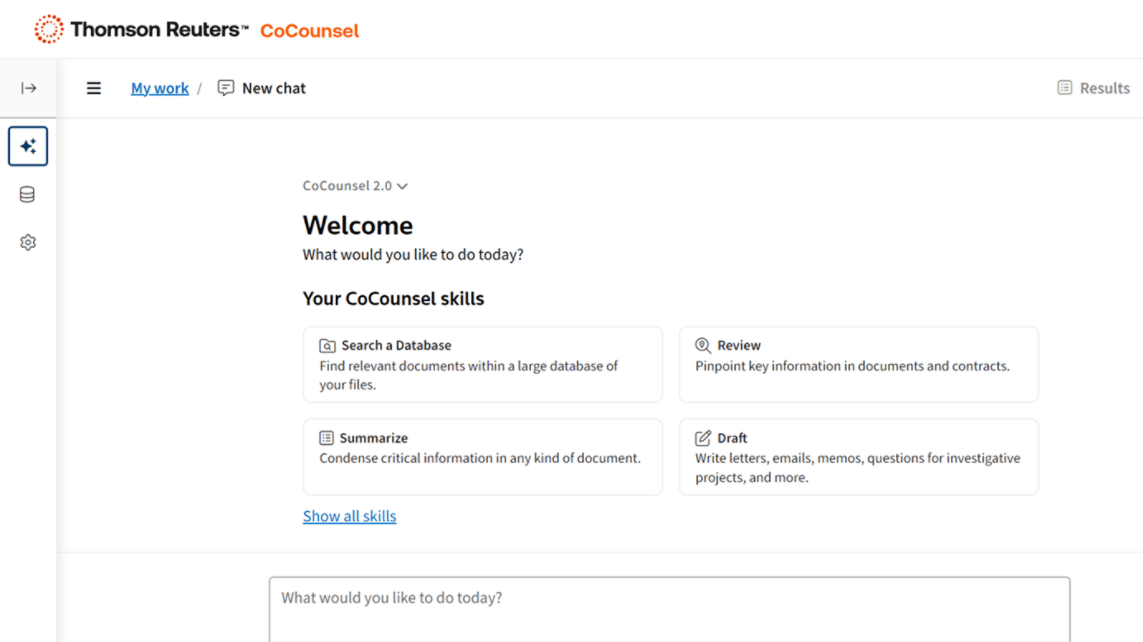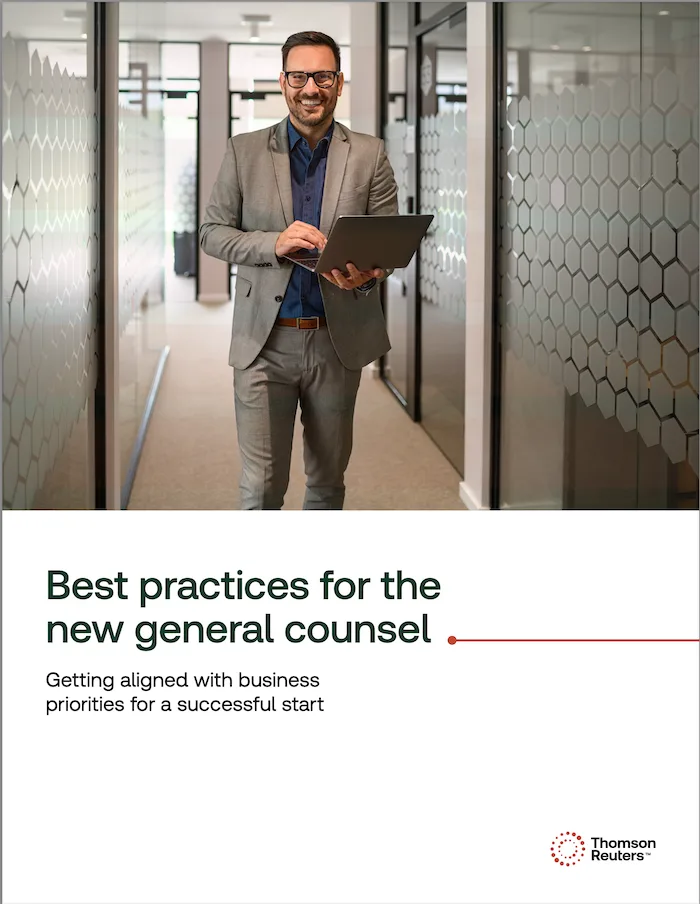The role of general counsel, top skills, tips, and resources for aspiring, new and seasoned general counsels
Photo credit: REUTERS/ Pascal Rossignol
A general counsel (GC) is the link between a company’s C-suite and its ground operations. They’re the bridge between a firm’s strategic management initiatives and its risk mitigation efforts. They put out fires, they reconcile departments at odds with each other, they make sure that everyone’s in compliance with various regulations. And their job only grows more complex with each passing year.
A good GC now wears enough hats to fill a wardrobe. They need to be comfortable in a wide variety of settings and need to manage an equally wide variety of responsibilities.
Jump to ↓
The role of General Counsel and how it’s changing
Essential General Counsel skills
Transitioning from private practice to in-house
Transitioning from in-house counsel to General Counsel
Management skills for in-house General Counsel

CoCounsel
Bringing together generative AI, trusted content, and expert insights for in-house teams
Meet your AI assistant ↗The role of General Counsel and how it’s changing
What is a general counsel? A general counsel (or chief counsel) is typically a company’s chief legal officer—its principal attorney and the legal adviser to the board of directors. GCs often report directly to the chief executive but their role is also to be a guardian of shareholders’ and the board’s interests.
Among many things, the GC strives to protect a company from operational legal risk. Their role is to represent the company in court, certainly, but an even more important role is to prevent the company from winding up in court in the first place.
The key adjective is “general”: the GC should have a solid grasp of all aspects of their business’ operations. Their job will take them into every corner of their company. They may need to handle legal issues for the accounting department or advise on whether marketing communications are violating any regulatory edicts. They may advise on tax exposures, intellectual property protections, data security initiatives, hiring issues and so much more.
How is the role changing?
Over the past two decades, the role of general counsel has greatly expanded. A company’s GC was once regarded as having a proscribed role, someone who provided technical legal advice, supervised, and administered the company’s internal policies, and made sure that all parties were complying with state, federal and, if applicable, international regulations.
The GC’s office was something like an emergency brake system, often arguing against anything with the potential for a higher level of risk, regardless of a company’s strategic needs.
As the nature of business has changed, so has the general counsel. The waves of corporate scandals dating to the Enron era, the strength of activist shareholders, the sea change in technological innovation, the threat of disruptive start-up companies and, at times in the U.S. and UK, a more activist regulatory regime (such as presently in the U.S.)—all of these factors have helped to transform the role that a GC plays within an organization.
A GC is now often directly involved in designing and implementing strategic planning, not just brought in to evaluate risk potential. And in-house legal departments are less of an exclusive preserve than they once were. The GC will now advise on corporate concerns at a level well beyond the standard questions of “is this in compliance?”
Of course, one of a GC’s primary roles is still to inform their colleagues about all the legal factors and risks in any potential move. But they’re now more deeply involved in the discussions as to whether to make the move in the first place: the GC is no longer confined to playing defense.
Essential General Counsel skills
So, with a GC becoming so integral to a company’s operations, what types of skills does a quality GC need to succeed?
Whether you’re considering becoming a GC, or just starting out, there is a wide array of categories; also dependent on jurisdictions so skills in the United Kingdom may differ.
Transitioning from private practice to in-house
Many lawyers are looking to make the move from private practice to in-house counsel. This requires a shift in mindset and skillset. Particularly important is to go beyond legal knowledge to provide business-specific advice. Ultimately, you want to become a strategic partner to the company.
Transitioning from private practice to in-house counsel requires a fundamental shift in both skillset and mentality. As external counsel, the focus is often on providing clients with an overview of the laws and regulations applicable to their business. However, to excel as in-house counsel, lawyers must go beyond merely demonstrating legal knowledge and use their understanding of the legal landscape to offer business-specific advice. This transition involves not just knowing the rules but integrating them into the broader corporate context, ultimately becoming a strategic partner to the business.
Senior Counsel M&A for Thomson Reuters
Transitioning from in-house counsel to General Counsel
Build your executive presence and stand out to general counsel and company executives. Every interaction and conversation with higher-level individuals is an opportunity to showcase your capabilities.
You want to catch the eye of both general counsel and other company executives. They will remember whether you come across as a clown or someone they would trust running the legal process in the event of company litigation or a significant M&A transaction — someone they would trust and follow in a crisis.
CEO and Senior Counsel for Hilgers Graben, PLLC
Soft skills
“Soft skills” are a general counsel’s non-legal or non-technical abilities. They’re the personality traits and emotional intelligence that enable them to interact effectively with other lawyers and company executives.
By honing their soft skills, they strengthen relationships, better achieve their objectives, and improve departmental efficiencies.

Soft skills for in-house counsel
An overview of the soft skills that in-house counsel require for career success
View practice note ↗Communication fluency
Communicate effectively. This means projecting your voice when public speaking and talking with confidence and authority—avoiding “ums” and “likes” as well as slang, sarcasm, or other types of unprofessional speech that might irritate or offend a listener. Know your audience—don’t slip into legal jargon when talking to a client. Calibrate how you respond to situations: know when to text, when to email, and when to send a formal letter.
It’s also important that a GC keeps their business and legal advice in separate realms, especially when talking with company employees. Remember that the attorney-client privilege usually won’t apply to an in-house attorney’s communications with a lawyer about business matters.
Presentation skills
GCs regularly need to inform management on the status of a legal matter or to educate employees as to how to comply with company policies. To do this effectively, GC presentations should be well-rehearsed, cleanly organized and customized to the needs of the particular audience (an audience of junior lawyers is different from one composed of senior partners, for example).
Business acumen
GCs serve their companies better if they accrue deep knowledge about the company’s operations. A skilled GC should know their way around their company’s marketing, accounting, IT and human resources departments, among many.
Make it a point of attending presentations and group meetings in various divisions, primarily as an observer. If there’s an issue with legal implications, bring it up with the appropriate parties afterward.
Time management
One way for a GC to endear themselves to their company? Run a tight ship. As companies bring more legal work in-house to reduce costs, a GC needs to have top-rank time management skills. Reduce the number of meetings you hold and keep those meetings as short as possible. Set aside designated times during the workday for email correspondence or phone calls.
Good time management also means avoiding micro-managing. Be confident in your subordinates and delegate your less critical tasks to them. Look to reduce wasteful legal processes and have standard policies in place so that your staff can hit the ground running. You don’t want to have to start from scratch each time an internal client asks the legal department for advice on a routine matter.
Management skills for in-house General Counsel
A quality GC needs strong managerial skills. They have to have executive leadership ability to ensure that a company’s legal department is properly structured, funded, staffed, and is working effectively to support a company’s goals.

In-House Counsel Skills to Support Emerging Law Department Responsibilities
New skills and competencies in-house counsel need to support legal and business requirements
View practice note ↗Operations management
Traditionally, GCs and other in-house counsel have managed all of their company’s legal and non-legal support operations. However, the field of law department operations (LDO) is developing in response to legal departments’ greater responsibilities and pressures. Many law departments now use dedicated LDO professionals for non-legal operations, such as training personnel and managing ESG and diversity initiatives.
What does this mean for a GC? If a company has dedicated LDO staff, the GC is their ultimate supervisor and their liaison to the rest of the company’s operations. The GC serves as the LDOs’ voice within decision-making and makes LDO staff aware of the company’s strategic goals and corporate culture.
Your executive team and business partners are looking for a lawyer who can think strategically. This means you can see more than just the immediate legal issue in front of you. It means you can “peer around corners” and see what’s coming down the pike and how it may impact your business legally and from an operational standpoint.
CEO and Senior Counsel for Hilgers Graben, PLLC
And if a company doesn’t hire a dedicated professional LDO manager? The general counsel will need to ensure that all LDO responsibilities are handled properly by in-house legal staff.
This requires great insight and flexibility in terms of how and where to allocate resources to manage various LDO responsibilities, with the likely potential that these responsibilities will only multiply in the future (such as a company embarking on more widespread ESG initiatives).
Financial management
A company’s law department was once regarded as a cost center that didn’t have much control over its expenses. No longer—legal departments have become a greater factor in a company’s overall budgeting, forecasting, and allocation decisions. That’s why GCs need financial management skills to, among other things:
- Keep their ongoing projects in accordance with the law department’s given budget;
- Convincingly argue for additional staffing or resources, if needed; and
- Document the legal department’s contributions to the company’s financials.
Third-Party management
A GC typically supervises a company’s third-party management initiatives, including negotiations, contracts, and communication with outsourced service providers, such as ALSPs and litigation consultants which handle legal research, coding documents and compliance and regulatory risk reviews, among other tasks.
If a company employs or licenses technology from a third-party vendor, a GC needs to thoroughly vet them. Third-party vendors present one of a company’s greatest security risks. A vendor with inadequate data protections or security procedures could easily expose the company to a data breach. A GC needs to establish protocols to guard against this. Checklist items include:
- Ensuring the vendor is adequately qualified and staffed for any services it will render.
- Keeping the vendor to the agreed-upon budget and agreed-upon timeframe.
- Making sure the vendor adheres to all security measures requested by the company and provides a detailed list of its own data security measures.
Regulatory management
Local, state, national, and international regulations that are applicable to a GC’s company will only increase in scope and volume in the next decade. While many companies have devoted regulatory compliance departments, general counsel can be responsible for:
- Designing, implementing and coordinating regulatory compliance programs.
- Briefing officials on regulatory requirements.
- Regularly auditing the company’s regulatory compliance efforts. Informing executives if any future business activities could be affected by regulatory developments.
- Performing due diligence on third-party service providers’ regulatory compliance programs and performance. Obtaining and reviewing regulatory updates from third-party providers.
- Implementing programs to close any compliance gaps.
- Coordinating with legislators, lobbyists, and other law firms to influence future regulatory developments.
Legal project management
GCs may use legal project management (LPM) techniques to assess ongoing and future projects. These include identifying the scope of a particular project, collecting resources for it, submitting RFPs, establishing the project’s budget and timeline and evaluating the outcome in order to refine and improve future projects.
One example would be a general counsel helping to assess their company’s plans to expand into a new state or a different country. They could provide a roadmap as to the regulatory environment, evaluate potential acquisition targets for potential liabilities, and note any potential difficulties in integrating acquisitions into the company’s commercial operations.
Tech-savvy skills
In all of a GC’s many responsibilities, none are more pressing than the GC needing to keep abreast of technological innovations and ensuring that their company’s use of technology doesn’t draw them into overly risky situations.
Some examples include:
Social media
How is your company using social media networks? What are all possible impacts in terms of reputational risk or other potential litigation opportunities that could arise from its use of social media?
Artificial intelligence
A GC needs to be aware of the proper use and licensing of AI technology as well as any potential copyright, intellectual property issues and other factors.
Data security
There are often overlapping legal and regulatory requirements concerning a company’s responsibilities for data breaches, from any mandated protections to what client notifications are required in the event of a breach.
Enhancing risk management
A GC should be familiar with any technologies that their company adopts, from document management systems to financial and budgeting software to AI. They should know how to review data, distinguishing between relevant and irrelevant information, and integrate data collection and disposal tools to enhance decision making.
For example, a GC could employ data analysis tools to bolster their risk management strategies. Such processes as contract management systems, claims registers, and litigation databases can all generate valuable data to enhance risk assessments. These provide a sharper perspective as to emerging risks in the company’s commercial and vendor relationships, and lets a GC more accurately measure potential litigation exposures.
Legal tech also enables a GC to accurately identify any of their company’s departments or lines of business that generate an excessive number of legal issues and take action to correct this. Being tech-adept enables a GC to:
- Ensure their company knows all relevant factors when making critical decisions;
- Advise on whether and when to take calculated risks; and
- Determine which commercial projects should be pursued and which avoided.
A GC as a company’s MVP
A general counsel has become of the most influential figures within a company’s operations. They may advise on every aspect of a company’s business—working to reduce risk and avoid litigation, helping to plan upcoming strategies, assessing how current business practices are performing.
This is why a GC must develop a repertoire of skills and knowledge to excel and perform at a top level. The role will only keep getting more challenging. But the rewards, in terms of adding value to your company, can be equally substantial.
Originally published November 21, 2023.
Chris O’Leary is a freelance writer and editor based in western Massachusetts. He is the managing editor of Thomson Reuters “The M&A Lawyer” and “Wall Street Lawyer,” and
is also the author of two books on popular music.
Raees Nakhuda joined Thomson Reuters in October 2021 and is the head of Mergers & Acquisition for the General Counsel’s Office. Prior to joining Thomson Reuters, Raees was a senior associate in the Corporate and Securities group at Blake, Cassels & Graydon LLP, where his practice focused primarily on international and domestic capital market transactions, including public and private financings and mergers and acquisitions. Raees holds a Juris Doctor degree from the University of Toronto and a Bachelor’s of Business Administration degree, with a specialization in Finance, from the Schulich School of Business at York University.











